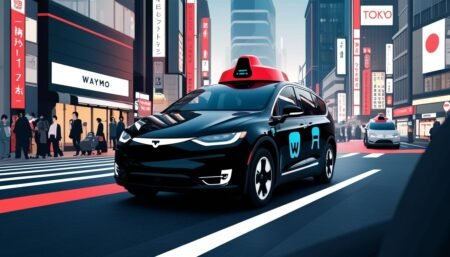At Meta Connect, the company reveals its innovative Orion glasses, a significant advancement in augmented reality technology, featuring holographic capabilities and an AI assistant.
Meta Unveils Groundbreaking Battery-Powered Orion Glasses with Holographic Capabilities
Menlo Park, California — At the highly anticipated Meta Connect annual event, Facebook’s parent company, Meta, unveiled a prototype of their latest innovation, the Orion glasses. These battery-powered spectacles are equipped with advanced holographic technology that overlays digital content— such as WhatsApp chats, web browsers, and calculators— onto the user’s real-world surroundings. This new release marks a significant departure from traditional augmented reality (AR) gadgets, like Apple’s Vision Pro, which rely on cameras and screens to recreate the physical environment.
The announcement was made by Meta CEO Mark Zuckerberg during his keynote speech at the company’s headquarters in Menlo Park. Zuckerberg described the Orion glasses as potentially the most challenging consumer electronics device created since the smartphone. The event showcased a variety of new technological advancements designed to encourage developers to update applications to take full advantage of these groundbreaking features.
Although an official release date for the Orion glasses has not been provided, Meta will begin testing the devices internally with its staff and a select group of external users. These trials are intended to gather feedback, enabling Meta to refine the product before a broader consumer launch.
According to Zuckerberg, the development of the Orion glasses involved significant breakthroughs across various fields of modern computing. The spectacles integrate cutting-edge display technologies and computer chips, striving to offer experiences traditionally found in headsets within a form factor not much bulkier than regular eyewear. The Orión glasses’ control system is highly sophisticated, utilising voice commands, eye movements, and hand gestures, which are tracked via a small bracelet.
Users can conduct various activities with Orion glasses, including playing virtual games, responding to WhatsApp chats, following recipes, and checking calendar appointments—all without needing to pull out their smartphones.
However, one of the key features, the Artificial Intelligence (AI) assistant developed by Meta, will not be available in the UK or European Union in the immediate future. This decision is attributed to uncertainties surrounding the European regulatory landscape for AI data use. Meta’s AI assistant will initially roll out in the United States, Canada, Australia, and New Zealand, markets where regulations are currently less restrictive.
Meta, along with 58 other consumer technology companies, has voiced concerns in an open letter to European policymakers. They argue that fragmented regulations could cause Europe to fall behind in AI advancements. The letter highlights how Europe has become less competitive and innovative compared to other regions. Due to the UK’s departure from the European Union, it is widely anticipated that Meta’s AI will be introduced to British devices and applications sooner than to those in the rest of Europe. Meta has already begun training its AI models using publicly shared data from Facebook and Instagram posts in the UK.
In response to data privacy concerns raised by the UK’s Information Commissioner’s Office, Meta has simplified how users can object to data processing within their account settings. Conversely, EU regulators have criticised Meta’s approach, stating that its current plans do not comply with stringent European privacy and transparency rules.
Aside from being a core component of the Orion glasses, Meta AI will be integrated across the company’s suite of social media and messaging platforms, including Facebook, Instagram, and WhatsApp. The company has reported that over 400 million people are using Meta AI monthly, with 185 million users engaging with the technology weekly.
The Meta Connect event also saw the announcement of new versions of Meta’s open-source AI models, Llama 3.2, enabling more advanced conversational capabilities.
Industry expert Mike Proulx, Vice President and Research Director at Forrester, commented that the Orion glasses could be revolutionary for the sector. Proulx noted a distinct difference in Zuckerberg’s enthusiasm when discussing AI and holographic glasses compared to VR headsets, suggesting that glasses might become Meta’s future focus. “VR headsets won’t go mainstream due to their cumbersome nature and limited user tolerance. However, glasses can put computing power into a common, familiar form,” he explained.
Since 2019, Meta has been collaborating with French-Italian brand EssilorLuxottica to develop multiple generations of Ray-Ban-branded smart glasses. According to Zuckerberg, the latest iteration of these smart sunglasses has outperformed sales expectations significantly, driven by their popularity among social media content creators and parents.
The previous versions of Ray-Ban glasses allowed users to capture photographs and videos from a first-person perspective using voice commands. This feature resonated well with the target audience, considerably exceeding sales forecasts.
With ongoing advancements and rigorous testing, the Orion glasses signal a bold step forward in AR technology, and Meta’s broader AI integration strategy indicates a strong commitment to evolving how consumers interact with digital content.
Source: Noah Wire Services
















